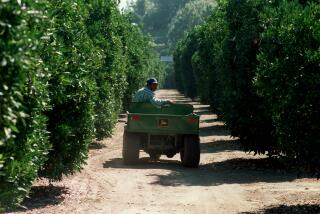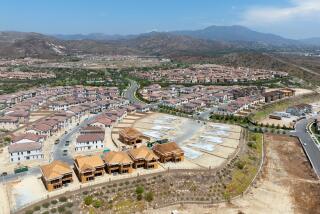Irvine Co. Leases Out Orchards, Ending Era of Direct Farming
When Irvine Co. orange pickers finished work Friday, it marked the end of a century-old tradition for a company that was founded on farming but now harvests its fortune from houses, high-rises and shopping centers.
On Monday morning, many of the workers will return to the orchards--but as employees of Treasure Farms, an Irvine-based grower that will lease the farmland from the Irvine Co.
Dean Buchinger, vice president and general manager of the Irvine Co.’s agricultural division, said the company is transfering to Treasure Farms the farming of 5,090 acres of avocados, Valencia oranges, grapefruit and lemons.
“Today is the last day for my operation as a direct farming operation,” Buchinger said Friday. “It is kind of the end of a long era.” That era began when company founder James Irvine Jr. began planting crops on his vast ranch before the turn of the century.
On Monday, only 14 of the 80 persons in the Irvine Co.’s agricultural division will remain employed by the Irvine Co. They will be retained to administer farming leases and to manage irrigation and property surveillance, Buchinger said.
Of the remaining Irvine Co. workers, about 38 will go to work for Treasure Farms and 10 more have been hired by Irvine Valencia Growers, a packing house that provides contract labor for the Irvine Co. Buchinger said 18 people, from office workers to equipment operators, will be obliged to take early retirement or seek employment elsewhere.
Buchinger declined to disclose the terms of the Irvine Co.’s lease agreement with Treasure Farms, a firm owned by a group of unidentified private investors.
Sun World, an Indio-based marketer of fresh fruits and vegetables, has an exclusive agreement with Treasure Farms to market all the produce grown on the Irvine Ranch. Howard Marguleas, an Irvine Co. director and shareholder, is also a major shareholder as well as chairman and chief executive officer of Sun World.
Treasure Farms was formed two years ago to take over operation of the Irvine Co.’s 16,000 acres of row crops, which include strawberries and tomatoes. A year earlier, the Irvine Co. withdrew from the cattle business and leased its 30,000 acres of rangeland to other cattle companies.
Irvine Co. officials said Friday that the conversion of the remainder of its agricultural operations to tenant farming is one of the last steps in the Newport Beach company’s plan to turn over day-to-day operations of its properties to contractors so it can focus on development.
Since 1986, the company has shifted a broad range of functions, from management of its apartment complexes and retail centers to construction of office buildings and homes, to contract companies and independent builders.
Under this “executive developer” concept, the Irvine Co. has said its aim is to reduce its financial risk and increase its ability to respond to real estate cycles. In the process, the company will have reduced its work force from a peak of 1,400 in 1986 to 400 by the end of this month, said Irvine Co. spokeswoman Judy Frutig.
Buchinger, who will remain in his same position, said he is uncertain how long farming will remain economically viable on Irvine Co. land. Maybe 15 or 20 years, he guessed. Much will depend on how economic factors spur or rein in development, he said.
During his 24 years with the Irvine Co., Buchinger said he has seen farming costs skyrocket. And he has seen farming become more difficult as people crowd in. “People like farms but they don’t like the manure or the mud on the roads. They drive too fast and don’t appreciate the necessity of moving agricultural equipment, which is slow.”
More to Read
Inside the business of entertainment
The Wide Shot brings you news, analysis and insights on everything from streaming wars to production — and what it all means for the future.
You may occasionally receive promotional content from the Los Angeles Times.










